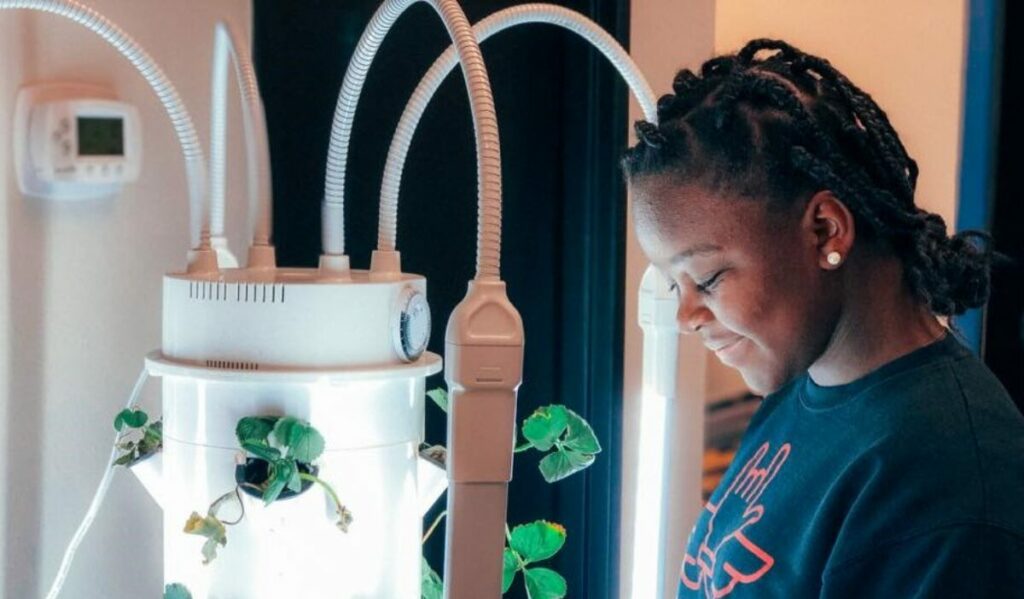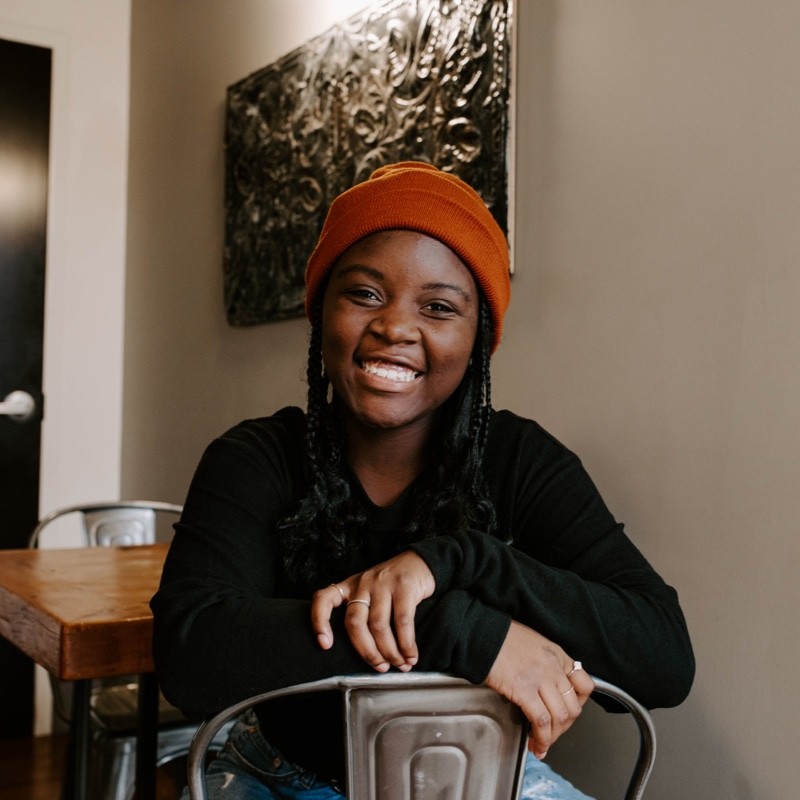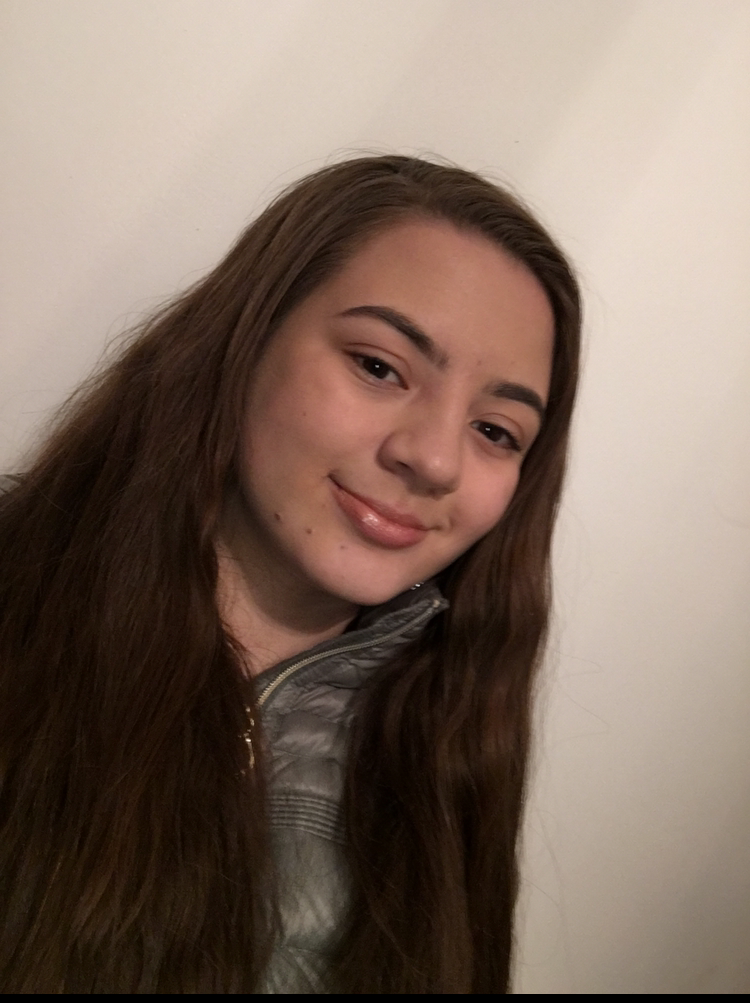It’s very important for every child to know their worth and to know that their potential is greater than the conventional system would have them believe.
Kalei Delovio, Advocate for Learner-Centered Education
In a recently moderated panel discussion, learner-centered leaders Grace Kiboko and Kalei Delovio were invited to discuss their respective experiences in learner-centered environments, including the personal transformation they underwent, and their ongoing commitment to making learner-centered education available to every child and young person in the country. Grace, now a freshman at Texas Christian University in Fort Worth, Texas, is a 2020 graduate of Iowa Big. Kalei, currently pursuing a career in nursing, is a 2019 graduate of the Met in Providence, Rhode Island. Grace and Kalei also serve on Education Reimagined’s Advisory Council.
Q. What was the biggest difference you found after transitioning from a conventional model of learning to a learner-centered one?
Grace: When I was in a school-centered environment my goal was to be “successful,” and I was good at that. I was good at gaming the system and getting good grades. However, when I transitioned into a learner-centered environment, my goal shifted from pursuing success in school to gaining skills to be successful beyond school.
A lot of conventional schools overlook that students aren’t equipped to imagine success (or learning) beyond school. Given this, students aren’t being empowered to make connections in their communities or to engage in community-based learning that helps them better value (and learn from) people who have different perspectives, backgrounds, and identities.
I was fine in a conventional learning environment. I was getting good grades and finding success. When I initially decided I wanted a more experiential learning experience, I thought I would still be focused on finding success within the school environment alone. I just didn’t want to sit in the same chair inside the same building for eight hours—every day.
What I didn’t foresee was that, at Iowa BIG, I would gain a completely new perspective of learning. Having access to diverse, community-based experiences in a learner-centered environment helped shape me into a more active and engaged learner.
Kalei: In my conventional school, I felt like I was going to fail in life because I wasn’t good at school. My grades were terrible, and I couldn’t imagine accomplishing anything as an adult. So, I started making a lot of bad decisions—there wasn’t anything else for me. At some point, I decided I needed to change my environment. And, when I heard about the Met, I knew it was the change I needed.
The biggest change I experienced was finally finding my voice and being heard. When I was in conventional schools, I often felt that I was just a number in a crowd. In that setting, whenever I approached a teacher to tell them I was struggling, they completely overlooked me and let me keep falling behind.
In my learner-centered school, they were concerned with supporting both my academic and emotional health. I saw that, as a learner and as a person, I had this hidden potential that no one had ever taken the time to help me discover.
Q. What did you learn about yourself during your learner-centered experiences?
Grace: I learned that I enjoy being a collaborative learner. In conventional schools, and especially in gifted programs, they tell you that you don’t need to work in groups because you’re smart enough to be successful in isolation.
And, for most of my educational experience, I felt like I didn’t need anyone’s partnership to be successful. I didn’t need to be collaborative because my own brain power was enough. My mindset completely changed at Iowa BIG, where collaborative learning was a normal part of my educational experience.
I came to enjoy and develop a passion for bouncing ideas off of other people. I was excited to hear other perspectives and not just rely on my own voice to carry me through my education. And, without that push to really foster a love of collaborative learning, I would not be the learner I am today—one who seeks out opportunities to work and create with others.
Kalei: I have become a more confident person because of my experiences in a learner-centered environment. Previously, I was more likely to think: “Do I really want to do this?” when faced with leaving my comfort zone. At the Met, I purposefully leaned into new opportunities like their internship program, through which I realized I wanted to be a nurse because I love helping people.
I also really love speaking on panels and advocating for kids, like me, who’ve had similar experiences in conventional education but don’t have the same access I’ve had to a learner-centered learning community that enables them to see and fulfill their potential.
Q. Connecting to and partnering with the community was a cornerstone of both of your educational experiences. Can you share why that was transformative?
Grace: There’s one memory that comes to mind. My senior year, I was very passionate about helping the community and partnered with a local nonprofit that serves food to people experiencing homelessness through a first-of-its-kind (in our state), pay-it-forward café. It’s built to make fine dining foods more accessible for those who can’t afford to have those experiences.
My team’s job was to design a way for the café to grow vegetables hydroponically, which meant I had to quickly get up to speed about hydroponic farming.
Through the experience of connecting with workers at the café and watching people come in to enjoy the food that we had learned to grow, I realized that my “small” learning opportunities can really make a big difference for real people every single day. I could see that with my own eyes, and that was when I knew learning doesn’t have to stop at passing a test or acing a quiz. Learning can be more meaningful and transformative.
Kalei: During my senior year, I was able to serve my family’s home community in Waianae, Hawaii, and film a documentary about supporting people experiencing homelessness there. Then, I shared the documentary with my local community in Providence, Rhode Island to educate them about the homeless community in Hawaii.
That was a great opportunity to teach kids and adults in Providence about a cause that was really important to me. It also allowed me to make connections to people in the Waianae community, which I continue helping by making regular donations to relevant organizations.
Q. What insights did you gain about your community from those experiences?
Kalei: I was inspired to film the documentary because of my desire, as a native Hawaiian, to address the lack of awareness, among people in Providence, about social issues in my native state. It also opened me up to learning more about the Hispanic culture in Providence and how their lived experiences compared to the lived experiences of Hispanic community members in Hawaii.
Grace: The biggest insight I gained was that there’s a lot more that goes into serving a community than people realize. It’s not just donating to a food pantry or a local organization and hoping those resources get into the right hands.
That food pantry or local organization has to create ways to sustain themselves. That’s really hard to do when you’re connecting with people you know don’t have the means to give back and support your success (and growth).
A big part of my experience with the nonprofit, growing food, was stepping back and realizing that challenges like creating a sustainable revenue stream go unnoticed until you’re really on the forefront of service work.
I had a chance to talk to people who worked in the café, including people working behind the scenes. Through those conversations, I learned how hard they were working to keep their goals alive and to reach the community in the best, most efficient way possible.
Q. Why are you so committed to ensuring the educational experience you each had is available to every child in the country?
Grace: In this time of digital learning during the pandemic, I’m realizing that learning has to be learner-centered. I feel educators and others in education are realizing that if they’re not focusing on how each student uniquely learns, every single day, they are failing. It’s about reminding educators why they’re teaching and advocating that school and learning is about students.
I also want to talk about the experiences my friends, who are in conventional high schools, are having as they navigate digital learning. Seeing them struggle to stay connected and remain passionate about learning has revealed to them that the learning they were doing before the pandemic was never about engagement.
It just happened to be that they were going to a school building that made them think they were engaged. That reality makes me want to advocate for this even more than when I was in a learner-centered environment myself.
Kalei: I’ve watched the potential of so many peers go unfulfilled because they never knew there were learner-centered educational experiences out there.
It’s very important for every child to know their worth and to know that their potential is greater than the conventional system would have them believe.
I’ve also realized that for so many children, going to school is the most positive experience they have each day. Many learners go home to very negative environments, but having access to this type of education can empower someone to believe, “I’m going to overcome this. I’m going to be different. I can do this.”
I also want to be a voice for showing adults that they’re learners, too. When I think about why education, as a whole, needs to change, I think about how it will benefit everyone.


